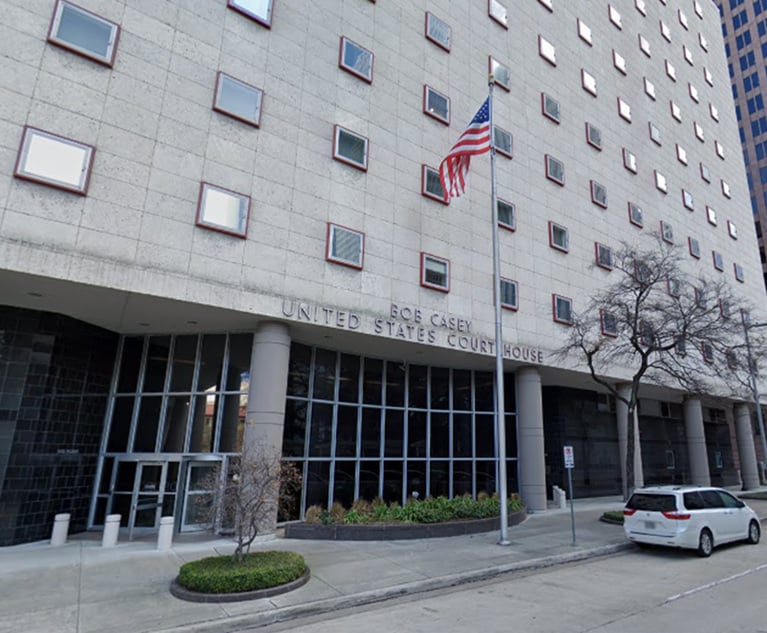Ex-Big Law Partner Dies After Life-Changing Assault, Robbery
Sanford Kaynor Jr. was left paralyzed and brain damaged following a 2012 shooting in New Orleans. He died Thursday.
April 20, 2018 at 02:45 PM
4 minute read

Sanford “Sandy” Kaynor Jr., a former special counsel at Jones Walker and one-time Ropes & Gray partner, died Thursday at 58.
His death came a little more than two years after one of his assailants received a 362-year prison sentence in a New Orleans criminal court.
On Oct. 2, 2012, Kaynor was left critically injured outside his home in the Uptown neighborhood of New Orleans after an armed robbery and carjacking. Kaynor's spine was severed as he was shot twice in the chest and back and left for dead by attackers who made off with his Cadillac sport utility vehicle and ransacked his home for other valuables while his wife and 8-year-old daughter slept.
Kaynor was found by his wife and taken to a nearby hospital, where he was pronounced clinically dead while in surgery, having lost some 30 pints of blood and suffered a brain hemorrhage. While he survived, the injuries that Kaynor sustained in the assault left him brain damaged, mute and paralyzed.
The Times-Picayune, in a story about Kaynor's death Thursday, noted that the three members of the so-called Marley Gang that attacked Kaynor—Charles “Mob Chuck” Carter Jr., Devante “Tae Banger” Billy and Byron “Poodie Man” Johnson—all received decades-long prison sentences for their roles in the crime. All three men were also implicated in the subsequent shooting death of a former University of New Orleans student before their arrest and incarceration. The trio could face additional charges and longer prison sentences if Kaynor's death is posthumously determined to be a homicide.
“The scourge of juvenile crime in New Orleans is real, and Mr. Kaynor's prolonged death at the hands of teen gunmen serves as a stark reminder that the plights of victims should take preeminence in public safety decisions,” said a statement from Orleans Parish District Attorney Leon Cannizzaro Jr.
Kaynor was born in Connecticut, the son of Sanford Bull Kaynor, a former general counsel at U.S. Industries Inc. Kaynor's uncle, William Kaynor, was a lawyer-turned-investment banker who spent 30 years as a partner at Davis Polk & Wardwell. Kaynor worked at a Pillsbury Winthrop Shaw Pittman predecessor firm and Ropes & Gray, where he was a partner in 2005 when Hurricane Katrina hit New Orleans, the hometown of his wife, Grace Kaynor. She testified at Johnson's trial in 2015 that she regretted relocating to the city with her husband and family.
In 2008, Kaynor left Ropes & Gray to join Jones Walker in New Orleans as special counsel, a role where at the time he said he looked forward to growing a “significant Gulf Coast practice.” In 2010, Kaynor led a Jones Walker team that advised Houston-based Enterprise Products Partners LP on Louisiana law aspects of its $1.2 billion purchase of a pair of natural gas gathering and treatment systems.
But the 2012 assault and robbery ended Kaynor's legal career. In the aftermath of the devastating attack, Kaynor was confined to a wheelchair and unable to care for himself. Family, friends and Jones Walker held periodic fundraisers to raise money for his long-term care. A Facebook page, Friends of Sandy Kaynor, chronicled those events, as well as pictures of Kaynor and his family from happier times.
Grace Kaynor, an interior designer whose New Orleans home was once profiled in lifestyle magazine “Southern Living,” became a vocal advocate for victims of violent crime after the attack on her husband. Kaynor is survived by his widow; a daughter, Phoebe; and a son, Granville, who publicly forgave his father's eventual killers. He died at home Thursday, a month before what would have been his 59th birthday, and nearly five months to the day after his mother, Laura Sanford Kaynor, who died at 88 on Nov. 20.
This content has been archived. It is available through our partners, LexisNexis® and Bloomberg Law.
To view this content, please continue to their sites.
Not a Lexis Subscriber?
Subscribe Now
Not a Bloomberg Law Subscriber?
Subscribe Now
NOT FOR REPRINT
© 2025 ALM Global, LLC, All Rights Reserved. Request academic re-use from www.copyright.com. All other uses, submit a request to [email protected]. For more information visit Asset & Logo Licensing.
You Might Like
View All
Law Firms Expand Scope of Immigration Expertise Amid Blitz of Trump Orders
6 minute read

Am Law 100 Lateral Partner Hiring Rose in 2024: Report

JCPenney Seeks Return of More Than $1.1M From Jackson Walker For Bankruptcy Work
3 minute readTrending Stories
- 1Inherent Diminished Value Damages Unavailable to 3rd-Party Claimants, Court Says
- 2Pa. Defense Firm Sued by Client Over Ex-Eagles Player's $43.5M Med Mal Win
- 3Losses Mount at Morris Manning, but Departing Ex-Chair Stays Bullish About His Old Firm's Future
- 4Zoom Faces Intellectual Property Suit Over AI-Based Augmented Video Conferencing
- 5Judge Grants TRO Blocking Federal Funding Freeze
Who Got The Work
J. Brugh Lower of Gibbons has entered an appearance for industrial equipment supplier Devco Corporation in a pending trademark infringement lawsuit. The suit, accusing the defendant of selling knock-off Graco products, was filed Dec. 18 in New Jersey District Court by Rivkin Radler on behalf of Graco Inc. and Graco Minnesota. The case, assigned to U.S. District Judge Zahid N. Quraishi, is 3:24-cv-11294, Graco Inc. et al v. Devco Corporation.
Who Got The Work
Rebecca Maller-Stein and Kent A. Yalowitz of Arnold & Porter Kaye Scholer have entered their appearances for Hanaco Venture Capital and its executives, Lior Prosor and David Frankel, in a pending securities lawsuit. The action, filed on Dec. 24 in New York Southern District Court by Zell, Aron & Co. on behalf of Goldeneye Advisors, accuses the defendants of negligently and fraudulently managing the plaintiff's $1 million investment. The case, assigned to U.S. District Judge Vernon S. Broderick, is 1:24-cv-09918, Goldeneye Advisors, LLC v. Hanaco Venture Capital, Ltd. et al.
Who Got The Work
Attorneys from A&O Shearman has stepped in as defense counsel for Toronto-Dominion Bank and other defendants in a pending securities class action. The suit, filed Dec. 11 in New York Southern District Court by Bleichmar Fonti & Auld, accuses the defendants of concealing the bank's 'pervasive' deficiencies in regards to its compliance with the Bank Secrecy Act and the quality of its anti-money laundering controls. The case, assigned to U.S. District Judge Arun Subramanian, is 1:24-cv-09445, Gonzalez v. The Toronto-Dominion Bank et al.
Who Got The Work
Crown Castle International, a Pennsylvania company providing shared communications infrastructure, has turned to Luke D. Wolf of Gordon Rees Scully Mansukhani to fend off a pending breach-of-contract lawsuit. The court action, filed Nov. 25 in Michigan Eastern District Court by Hooper Hathaway PC on behalf of The Town Residences LLC, accuses Crown Castle of failing to transfer approximately $30,000 in utility payments from T-Mobile in breach of a roof-top lease and assignment agreement. The case, assigned to U.S. District Judge Susan K. Declercq, is 2:24-cv-13131, The Town Residences LLC v. T-Mobile US, Inc. et al.
Who Got The Work
Wilfred P. Coronato and Daniel M. Schwartz of McCarter & English have stepped in as defense counsel to Electrolux Home Products Inc. in a pending product liability lawsuit. The court action, filed Nov. 26 in New York Eastern District Court by Poulos Lopiccolo PC and Nagel Rice LLP on behalf of David Stern, alleges that the defendant's refrigerators’ drawers and shelving repeatedly break and fall apart within months after purchase. The case, assigned to U.S. District Judge Joan M. Azrack, is 2:24-cv-08204, Stern v. Electrolux Home Products, Inc.
Featured Firms
Law Offices of Gary Martin Hays & Associates, P.C.
(470) 294-1674
Law Offices of Mark E. Salomone
(857) 444-6468
Smith & Hassler
(713) 739-1250










